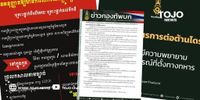In a recent move underscoring Thailand's ongoing battle against corruption and money laundering, the Anti-Money Laundering Office (AMLO) has ordered the seizure of 60,000 baht in cash linked to a complex case involving a Chiang Dao district official and his associates. This case, which centers around the illegal issuance of a Thai ID card to a Chinese national, reveals a disturbing network of corruption and exploitation that has rattled public confidence in local governance.
The AMLO's Order No. Yor.248/2567, dated September 5, 2023, details the findings of a foundational wrongdoing report. The investigation began when Ms. Hong Yu, a Chinese national without legal status in Thailand, filed a complaint alleging that Mr. Haibo, also Chinese, had extorted 730,000 baht from her. Notably, Mr. Haibo was found to be using a Thai ID card belonging to Ms. Alisara, a Thai woman who tragically passed away in 2003 (2546 BE), raising immediate suspicions about the authenticity of the documents involved.
Police investigations uncovered that Ms. Hong Yu had approached Mr. Abe Kamnan, a local leader of Muangna sub-district in Chiang Dao, to facilitate the illegal issuance of a Thai ID card. This arrangement was not without cost; Ms. Hong Yu reportedly paid a hefty sum of 730,000 baht in two installments to various officials, including those at the district office. On November 17, 2022, Mr. Abe personally accompanied Ms. Hong Yu to the Chiang Dao district office to process the fraudulent ID card. Key figures in this process included Mr. Permkiat, the district registrar, and Mr. Amarat, who witnessed and signed the necessary documents.
The legal consequences swiftly followed. On November 3, 2023, the Criminal Court for Corruption and Misconduct Cases Region 5 found Mr. Permkiat guilty of illegally accepting assets. Subsequent rulings on March 13, 2024, further convicted him and other accomplices of offenses related to corruption and abuse of official position. These rulings highlighted how the defendants exploited their positions to demand and receive illicit payments, undermining the integrity of public administration.
Following these verdicts, the AMLO committee convened on December 7, 2023, to deliberate on asset seizures connected to the case. The Secretary of AMLO issued Order No. Mor 769/2566 on December 25, 2023, mandating the seizure of assets from Mr. Permkiat and his associates. The seized asset—a sum of 60,000 baht in cash—was found in possession of Mr. Somsak as of January 6, 2023.
The asset seizure order, issued on March 24, 2025, allows a 90-day window for Mr. Somsak to contest the decision, lasting until June 21, 2025. This precaution is crucial, given the liquid nature of cash, which can be easily hidden, transferred, or dissipated. The AMLO's swift action aims to prevent such assets from vanishing before the judicial system can finalize their disposition, ensuring that illicit gains do not escape accountability.
In a parallel development highlighting broader concerns about money laundering, the Anti-Money Laundering Committee (AMLO) has intensified scrutiny of cases linked to online gambling networks, a growing source of illicit funds in Thailand. On July 31, 2025, a high-profile meeting was held at the Parliament Building, chaired by Mr. Lerisak Wattanachaikul, to assess progress in these investigations. The meeting included key figures such as Mr. Danuporn Punnakan and Mr. Nont Paisanlimjaroenkij, alongside experts and advisors, reflecting the gravity of the issue.
One focal case discussed was that of a former president of Lamphun Warriors Football Club, accused of involvement in online gambling operations and associated money laundering offenses under the Anti-Money Laundering Act. Officials reported that authorities had seized 221 assets valued at over 671 million baht in this case, demonstrating a robust enforcement response.
However, the committee expressed concern over discrepancies in legal enforcement when comparing this case to that of the former president of Nakhon Si United Football Club. Despite similar allegations, the latter case has yet to see any asset seizures or formal charges, raising questions about consistency and fairness in the judicial process.
Dr. Pramet Chaypatcharakul, Secretary to the Committee, probed deeply into the investigative procedures, questioning the thoroughness of financial tracking, the effectiveness of asset freezing measures, and the clarity of evidence presented during preliminary investigations. He stressed the importance of meticulous case review at the prosecutorial level to ensure justice is served transparently and equitably.
Chairman Lerisak Wattanachaikul underscored the broader societal impact of online gambling, noting that many citizens have suffered from its proliferation. He emphasized that transparent and uniform application of the law is essential, not only for upholding justice but for restoring public trust in the legal system. "This case is not just one among many; it is a mirror reflecting the strength of Thailand's justice system in the eyes of the public," Lerisak remarked. He pledged that the committee would not allow critical societal questions to be dismissed without thorough answers.
In pursuit of this goal, the committee plans to invite representatives from the Office of the Attorney General to future meetings. This will provide a platform for clarifying prosecutorial decisions, especially concerning instances where prosecutors have opted not to file charges despite police recommendations. Such transparency is vital for public understanding and confidence.
The committee’s approach is one of constructive oversight, aiming to combat money laundering linked to online gambling with efficiency, fairness, and a steadfast commitment to the public interest. The ongoing investigations and legal actions against corrupt officials and gambling networks highlight Thailand’s determination to strengthen the rule of law and protect its citizens from exploitation and financial crimes.
These developments, from the Chiang Dao district’s fraudulent ID card scandal to the high-profile online gambling cases, reveal a nation grappling with complex challenges in governance and law enforcement. Yet, they also demonstrate a system willing to confront these issues head-on, employing legal tools and institutional cooperation to safeguard integrity and justice.

